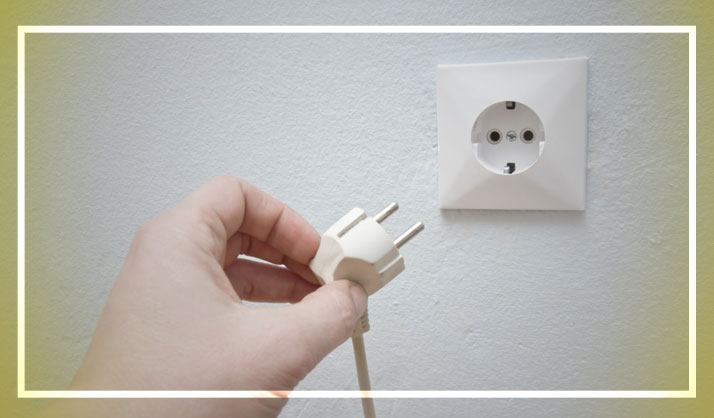Are you worried about how safe it is to plug in your refrigerator to any other outlet? There are a few different options to connect your refrigerator to an electrical outlet. So, the obvious follow-up question is, “Can you plug a refrigerator into a regular outlet?”
Plugging in a major appliance without first checking to see if it is compatible with the outlet you intend to use could potentially damage the appliance. There should be a dedicated outlet for connecting the refrigerator because it consumes so much power.
You can alternatively connect it to a standard outlet, which typically has a voltage ranging from 110 to 120 volts; however, the former is the preferable option.
In case you’re feeling a little lost, this article should help you out.

What Kind of Outlet Should I plug My Refrigerator into?
Standard household outlets can accommodate the electrical needs of a typical refrigerator. That means you don’t require a dedicated circuit to use a refrigerator. Your fridge only needs the usual electricity of 110–120 volts, which may be supplied by any wall socket.
However, because refrigerators require a more significant amount of energy, it is recommended that you utilize a separate circuit that has a circuit breaker.
Additionally, having a dedicated circuit can be hugely advantageous because it protects your refrigerator from being harmed by fluctuations in the supply of electricity. It also protects your home from any mishap related to the power supply.
You’ll also need a regular three-pronged wall outlet for your refrigerator. One of the prongs is round, while the other two are square and fit into standard-sized holes. However, it is recommended that you install a separate circuit just for your refrigerator. This means that you can use the same outlet for something else, but you obviously shouldn’t. This will guarantee that your fridge has enough power to function properly.
In conclusion, a regular electrical wall outlet will work just fine for plugging in your refrigerator. However, for optimal performance, this outlet should be dedicated exclusively for use by the refrigerator.
How Safe is it to Use an Extender Cord with a Refrigerator?
If you want to be safe, plug your fridge into a standard electrical socket. In the case of extension cords, they are designed for a temporary application, and refrigerators require steady power.
The potential for danger can come from a number of sources. If the refrigerator overheats due to insufficient power from the extension cord, there is a high risk of a fire. Also, if you leave your lengthy extension cables lying around or coiled under your fridge, they could get damaged because of the heat they generate. In addition, using the incorrect extension cord poses a severe threat to your refrigerator.
Because of these dangers, the refrigerator’s manufacturer also advises against using an extension cord. However, if you really need to use an extension cable, use one that is rated for the power requirements of your refrigerator, is grounded, and only has one appliance plugged into it at a time.
FAQs
Hopefully, the following set of questions and answers will help you figure out where to plug in your refrigerator.
1. Can I plug a freezer into a regular outlet?
A freezer is one of the appliances that is pretty easy to setup, as it only requires access to a standard electrical outlet. For safety, freezers need their own dedicated 120 V, well-grounded with a three-prong socket and a 15 or 20 A circuit breaker. The freezer must be plugged into a dedicated but regular circuit.
2. Can I plug a fridge and a freezer into the same outlet?
Although it is not advised, you can use the same outlet to power both a refrigerator and a freezer if their combined power consumption is less than the circuit’s capacity. There is a potential for an unsafe situation, such as when both devices start up at once, their combined power consumption spikes and trips the circuit breaker.
3. Should You Use A GFCI Outlet For Your Refrigerator?
It’s not safe to plug a refrigerator in a GFCI outlet. These outlets are common in the bathroom, the kitchen, and other high-moisture areas of your home. The reduced probability of electrocution and house fires is just one of the many advantages of this particular outlet.
However, a refrigerator has the potential to trigger GFCI outlet trips. If not caught in time, this could lead to spoiled food in your refrigerator.
Bottom Line
Any time you plug an appliance into a power outlet, you should do it with extreme caution. There is a need for extra care when plugging in a refrigerator. You do not require a special outlet because you can plug your refrigerator into any regular outlet that operates between 110 and 120 volts. As an extra precaution, use a wall outlet rather than an extension cable.
I’m James. The author of Electricalaffairs.com. It’s been my passion to deal with power tools and gears. This website is mainly to talk about electrical wirings, lighting, various power source tools and accessories. I want to explore tackles and help people to grow their basic knowledge about electrical things. I would also like to help people to pick the right power tool for their daily needs.

Enjoyed the article. Something that would have been helpful is having made a reference to the IFC or other related safety regulatory code, such at CCR Title 8 or the 29 CFR 1910 series.